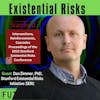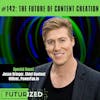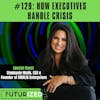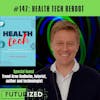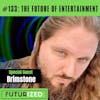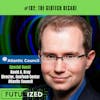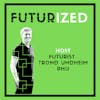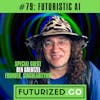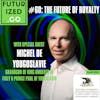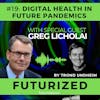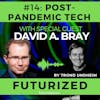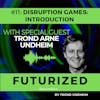Performance Food
Luci Gabel, Nutritionist, Adjunct Professor at San Jose State University, and author of Eat to Lead, interviewed by host Trond Arne Undheim, futurist, investor, and author.
In this conversation, we talk about Luci's own path to healthy eating. We go thr...
Luci Gabel, Nutritionist, Adjunct Professor at San Jose State University, and author of Eat to Lead, interviewed by host Trond Arne Undheim, futurist, investor, and author.
In this conversation, we talk about Luci's own path to healthy eating. We go through a brief history of diets, from low Fat, low Carb, Atkins, Veg, Organic, Low Sugar, and Keto. I ask Luci about best practices from her Eat To Lead book, we get into the Dynamic Lifestyle Roadmap and get the lowdown on Fruit, Carbs, Protein and Fat. We discuss microbiome awareness as well as her Five-Star restaurant secrets. Lastly, we hit on the emerging future of personalized wellness, longitudinal nutrition research, longevity, brain health, tech, and increased performance.
My takeaway is that performance food is not yet here but it will be. When it is, hopefully the lessons can be shared widely. For now, we have precursors like Luci, who are inviting each of us to be more mindful of what we eat and watch the results closely. Clearly, positive effects can be had, but we still don't fully understand the cause and effect. Nutrition is indeed a topic for the future. We should Eat to Lead, that's a great aspiration.
Having listened to this episode, check out Eat To Lead as well as Luci Gabel's online profile:
- Eat To Lead (book): https://www.eattolead.com
- Personal website: https://www.lucigabel.com
- LinkedIn: https://www.linkedin.com/in/lucigabel/
- Instagram: https://www.instagram.com/lucigabel/
- Facebook: https://www.facebook.com/EattoLead/
- Twitter: https://twitter.com/lgfit?lang=en
Thanks for listening. If you liked the show, subscribe at Futurized.org or in your preferred podcast player, and rate us with five stars. If you like this topic, you may enjoy other episodes of Futurized, such as episode 2 on The Future of Beverages, episode 36 Future of Cultured Meat, or episode 80 The Future of Personal Development.
Futurized—preparing YOU to deal with disruption.
Performance Food
Trond Arne Undheim, Host: [00:00:00] Futurized goes beneath the trends to track the underlying forces of disruption in technology, policy, business models, social dynamics, and the environment. I'm our host thrown on it in time futurist and in episode 87 of the podcast, topic is performance food. Our guest is Lucy Gable, nutritionist, and adjunct professor at San Jose state university and author of Eat to Lead.
[00:00:27] In this conversation, we talked about lucid zone path to healthy eating. Go through a brief history of diets from low fat, low carb Atkins, veggie, organic, low sugar and keto. I asked Lucy about best practices from her beat to lead book. We get into the dynamic lifestyle roadmap and get the low down on fruit carts, protein and fat.
[00:00:48] We discussed microbiome awareness as well as her five star restaurant secrets. Lastly, we hit on the emerging future of personalized wellness, longitudinal nutrition, research, longevity, brain health tech, and increased performance. Lucy, how are you doing today?
[00:01:07] Luci Gabel, Nutritionist (guest): [00:01:07] Great. I'm doing great. How about you?
[00:01:09]Trond Arne Undheim, Host: [00:01:09] I am doing okay, but I've been editing videos all night, so I hope no one can see that, but it's a tough life when you're a podcaster and doing a lot of this was actually trading material, which I think you can sympathize with as a university person.
[00:01:24] That's there are a lot of chores.
[00:01:26] Luci Gabel, Nutritionist (guest): [00:01:26] Yeah. The stuff you didn't imagine you'd be doing, like with the podcast, you're editing videos.
[00:01:32] Trond Arne Undheim, Host: [00:01:32] Yeah, there's a lot of stuff. So I wanted to talk about performance with you and performance foods. Lucy, how did you get into this business of food and performance? You I've read your book each lead gig.
[00:01:44] Give me a sense of how you got into this business. You're obviously educated in this field, but you're also educated in. Business. So you have this dual background in, in kind of business and nutrition. How did this, how did you get here?
[00:01:59]Luci Gabel, Nutritionist (guest): [00:01:59] First of all, thanks for reading the book. I'm so pleased that you read it.
[00:02:04] Yeah. And I do talk a little bit about it in the book, but not a ton about how I got to writing the book. Yes. I have dual experience, dual educations. One is in health, physiology and nutrition. The other one is in business and I've gone back and forth between the two and done them concurrently at the same time.
[00:02:22] So essentially it's given me the same amount of experience in education in both. And I did think that I needed to write a book about it because it seemed, for so many people it's very complex. How do we make food and health? Match our lifestyle and it can be really confusing and it was for me too.
[00:02:43] So that's one thing I talk about is I actually did start off as a pre-med major in college and I did learn about health and I thought I learned a lot about the body at the time, college education. Then I went into. My first position early on in life in my early twenties was a leadership position working for the department of defense.
[00:03:04] I had people everyone was older than me, I believe at that time that I was leading. So you can imagine how challenging it was to be a leader to be thrown into leading group, a huge group of people that were all very ag. Knowledgeable and experienced. And I was exhausted and I was trying to eat right and take care of myself.
[00:03:25] Like I thought I had learned and I just couldn't figure it out. Sometimes I would get this teeny weeny glimpse of, what it feels like to feel good and energized. And I would try to figure out what did I do to make that happen, and it was difficult. It was too difficult for me. And went back to school a little bit later on in life. I did everything that most people do. You read magazines, you read books, we listen to experts, and then you try to fit that in. But what we don't understand is that when we're doing that, as we're getting little pieces of information from various opinions or aspects of what people understand or want to promote with health, and we're not getting the whole picture for ourselves,
[00:04:09] Trond Arne Undheim, Host: [00:04:09] I like the personalized story and the personal approach that most people have to their, a subject that they're, that they care about.
[00:04:19]And that also becomes a profession because there's something authentic about it. You had the issue yourself and now you're trying to figure it out and then share it with others. This idea of food as performance, though. It's out there, right? In culture. Everyone says, you are what you eat.
[00:04:38] And yet there are all of these diets everywhere. And I, I was fascinated by that aspect of this book because you're like the. The non you're the non book on the subject, right? In a certain sense. Yeah. The non diet book, but you're you're saying, yes, we are on solid footing with some of this insight, but there's also so much.
[00:05:02] Stuff out there that doesn't have any bearing, in terms of science or at least it's like tilted science or it's just twisted facts or it could even be like you pointed out. I don't know you that giving people bad intentions, but there's just, why is there so much stuff out there that talks about food as if.
[00:05:23] People really know what they're talking about. And then you discover that they either don't or they just are completely over-blowing their claims. And part of your book is about that. And then part of your book, I think is about finding the narrow path through there because you eat your lead.
[00:05:41] You actually have a very strong thesis at the end of the day. Thank you. I think so. Tell me more about that.
[00:05:48] Luci Gabel, Nutritionist (guest): [00:05:48] Okay. To answer that question about how is it that, we get these varying aspects or ideas and yes. What are people thinking when they're putting out this information that isn't quite the right information or the best information?
[00:06:01]There's two. I think there's two reasons. Really one is that sometimes people have just enough information to be dangerous. I'm sure you've heard that before. And the word expert. Is thrown around a lot now. So how are we an expert and who made us an expert, et cetera. And Google is an easy way to research these days.
[00:06:25] And so what is the research that someone has been doing? And we also get siloed. That's now a common term, right? We have with our ed, our silos of information. So if we keep going, if we're very passionate about a topic. And we believe we know the answer, we can easily go and find the research that proves that answer.
[00:06:44]That's called cherry picking in science, and this is actually the course that I'm teaching right now at San Jose state university is how to read research, how to understand research and also how the media puts research out. And then go into that and see, is this a bias report or, is it pretty straight forward?
[00:07:05]Yes,
[00:07:05] Trond Arne Undheim, Host: [00:07:05] go ahead. No, I was just saying, I think the media has a very strange relationship with science because on the one hand, right there, the media wants to be on the side of truth and they sometimes conflate truth and science, which is also not. As simple as that as but on the other hand they run, they run after the same fads as others.
[00:07:24] I was just going to ask you a little bit about the brief history of diets, because I I I've know, I know you've looked into it. Part of the book is a little bit about, how throughout. The last 30 years, right? It's been like, Oh, low fat, low carb low meat, high vege, organic everything, low sugar, keto diet.
[00:07:43] And this is just like this scratching, the surface of diets. How did all of these things get going with w which ones have done the most damage, would you say? Because I read your statement basically. Throughout the book as a anti, not only anti diet, but there are things we can know about this but diet in and of itself is a dangerous tool to apply that knowledge.
[00:08:11] Is that a fair characterization of one part of your position?
[00:08:16] Luci Gabel, Nutritionist (guest): [00:08:16] Absolutely. I totally. Agree with that encompassing of my message. Yeah.
[00:08:22]Trond Arne Undheim, Host: [00:08:22] But these history, this historical diets, so some of them are, celebrity proponents, others are doctors in various forms, turned into entrepreneurs typically.
[00:08:34]How do you see that business of selling diet books? You must have a. I guess an interesting relationship to that, given that some people might read your book and say you're in the history of the trajectory of that sale. Oh my gosh, I know. How can you, how can you put yourself both on the inside and on the outside of all this massive consumer trend, which it is to care so much about what we eat, that we are willing to buy anything, listen to anything, do anything.
[00:09:04]To hopefully improve, our life.
[00:09:06] Luci Gabel, Nutritionist (guest): [00:09:06] First of all, this is a perfect question because the last question I said was fold. And so you actually just led me into the second piece. The first thing I said was, being siloed or just not enough information to make the whole picture, but this other section that you're talking about a lot of it has to do with marketing.
[00:09:26] And by the way, I'm so pleased you brought it up because for me and writing this book, it was so difficult to walk the line of science, which really, when you are brought up in the science educational world, it's really about not having any inclinations, wipe out your passions and just look at the data.
[00:09:51] And see, that's the only way you can see the clear data, but if you're passionate about this, and showing everybody that this way that I found that I did that worked for me is the right way that everybody should be doing. You're not going to see the data clearly. So that's science and that's boring.
[00:10:06] If you don't have any passion in it, how do you tell people about it and get them on board and help them understand, but just get them interested in the first place. Then we have marketing on the other side, which is almost the exact opposite of that, right?
[00:10:22] Trond Arne Undheim, Host: [00:10:22] Yeah. And then there's food, and people in the middle who are some somewhat, it's, easy to understand how fascinating food is because.
[00:10:29]We're making all these judgments because we think we actually are the science in a certain sense. Tell us more about that because we, I want to get into some of your best practices also, but just explain this process, how you have come to understand what individuals are doing around this.
[00:10:46] So there's either too much or too little information, but either way, whether we feel informed or not, we are certain. There's this certainty around food, like there's this oscillation, I guess also between certainty and Oh, I have no idea. I need expertise, but there's somehow this relationship where it's not like other domains of knowledge, it seems where, you're seeking it out.
[00:11:08] And then you're like, Oh, okay. That could be true. People just pick a position on food and they run with it.
[00:11:15]Luci Gabel, Nutritionist (guest): [00:11:15] It's there's that passion piece we just talked about. So whatever it is hits, and that's the marketing piece too. It's If you really get into marketing, which I have, because I have that leadership business side as well.
[00:11:26] So I studied marketing significantly and you get into the words that light people up, or, press people's buttons. Of course they are, and those words are never the scientific words, right? They're the emotional emotive words. And we get passionate about something. When someone can press that button in us can light that flashlight or that light bulb in our heads and go make, let's go.
[00:11:52] I had that experience. I felt that way. That must be why it doesn't actually even need to be backed by science. It just has to be backed by someone's story who had the same situation as you, who found the answer through this. Whatever it is or proposing to you. Okay.
[00:12:09] Trond Arne Undheim, Host: [00:12:09] So let's just for a brief second, going into your best practices are you say, eat to lead?
[00:12:14] That's the title of the book. You have something called a dynamic lifestyle roadmap. And I want to ask you about that roadmap. And then as part of the ingredients, that you like not surprisingly, you seem to like fruit. But then you have this whole thing about carbs, which you think are misunderstood.
[00:12:30] I want to talk about carbs a little bit, and then you get into proteins. Good and bad. You get into fat. And and then lastly, I guess into kind of microbiome awareness, that's a concept I was picking up. So these are elements of this dynamic lifestyle roadmap. So what kind of roadmap is this and how do we get there?
[00:12:49]Luci Gabel, Nutritionist (guest): [00:12:49] It's a dynamic roadmap because it's different for every human. And that's why it's really more of a pick these questions. There's a few questions. I post everyone with each chapter and I really want people to think about these questions for themselves and the food that they're eating and how they're feeling and the energy they're getting and the sleep they're getting.
[00:13:09] Just how one or two foods. Or effecting that and then jot some thoughts down, some observations down, and then you come up with your own personal conclusions about what's working and what's not working and what you might want to change based on your experiences. So that, and that's how we, I have the structure for the roadmap, but then readers will fill that in.
[00:13:32] And
[00:13:33] Trond Arne Undheim, Host: [00:13:33] do you want us to create food diaries? That's what you're saying.
[00:13:36] Luci Gabel, Nutritionist (guest): [00:13:36] It's a little bit like that. Yeah.
[00:13:38] Trond Arne Undheim, Host: [00:13:38] So it's important enough that we, people usually spend their diary time on kind of the most important things that they experience in their, in, in their day. And you think that in order to make any kind of reasonable progress on food you have to almost treat yourself as you're the scientist of your own body in a certain sense.
[00:13:56] Yeah.
[00:13:57] Luci Gabel, Nutritionist (guest): [00:13:57] It's your own experiment on yourself and we can't objectively. Analyze the data, if we don't have any data. So there, you have to take some data because our memories, let's be honest here. Unless you eat the same thing, every Wednesday, do you remember what you ate last Wednesday for dinner?
[00:14:20] Trond Arne Undheim, Host: [00:14:20] Yes. So there is that aspect but let me challenge you on this idea of, using the N of one, which is yourself. In personalized medicine, there is this idea that, some combination of you and science looking at you will come up with these personalized treatments, but surely we're not really there.
[00:14:38] So I'm looking at myself and I look at my eating and let's say, I even wrote down what I ate. And I have tried right. To write these down, using apps and other things, at least the. Style of app that I tried, it got very time consuming to jot down and the point there was calorie. So you're like, you're always hunting for calories.
[00:14:58] You're like, Oh, I ate a meal. I must've eaten 500 calories. And then after a while you're like, okay, I think I have it down. There's a pattern here. This is more or less what I'm eating. But then it gets hard to really get to deeper insight because either it's just too hard to keep tracking and you keep veering off these things, or you start really questioning whether this app knows what they're talking about or even if the food really is accurate because any of the calorie counting that I've ever done, there are so many errors in this system.
[00:15:29] So I'm just trying to say. How is just writing down what you eat, gonna get you there. And can you give us a better sense of how this works for you?
[00:15:39] Luci Gabel, Nutritionist (guest): [00:15:39] Yeah. You can use an app of course. Cause some people are really attracted to that technology, but the thing really is to just like research. Is to focus on one thing at a time.
[00:15:51] So I think what happens, what you're talking about when an app it's so intricate and time-consuming et cetera, is that we go into the app and we're recording all of our meals, which is great. And I don't think we should do that. We don't need to do that for months at a time. Although some people enjoy it, we can do it for seven or 10 days and get a good idea, whatever.
[00:16:11] Or I also talk in the book about just pick one thing you want to look at. So let's start right now with, the amount of vegetables you're eating every day. How many vegetables in servings, which I make easy as well, because servings are all over the place. If you use an app, it'll be like, for lethal greens, it's a whole cup.
[00:16:30] And for something more solid, it's a half cup work. You don't, we don't care about that. I just want to, in the form of a handful or a cup worth or a large vegetable, how many are you eating a day? And. Then go from there. And when do you eat vegetables at lunch? Do you feel a different kind of energy throughout the day?
[00:16:48] Does your food last longer? Does your energy last longer, into the evening? So simplify, and that is what research does too. When we have a research study, no one study can look at everything and that's unfortunately, what. Kind of media has conditioned us to think, Oh, there was this one study that came out.
[00:17:07] So it means that everything has changed. Nothing is the same that we thought when really studies are all about let's pick this one, teeny weeny part of this big problem, and let's look at just it. And then we'll find out if it reacts with this other things. And then someone else can do another study and pick another part.
[00:17:25] And that's.
[00:17:25]Trond Arne Undheim, Host: [00:17:25] You're so right. And I think even scientists sometimes so people who have studied science, I find myself being quite critical to things I read, but I will admit that sometimes if I need something in an argument and, or like in a discussion and I have read a study, even if it has nothing to do with my field, maybe I haven't even read this study, which is horrible.
[00:17:47] I've just read a headline about a study. I will use it for Colloquial benefit of mine and completely misused the science. It happens. You're not
[00:17:57] Luci Gabel, Nutritionist (guest): [00:17:57] alone. It's crazy. Everybody
[00:18:00] Trond Arne Undheim, Host: [00:18:00] does it. He does it, but that's how this thing gets corrupted,
[00:18:04] Luci Gabel, Nutritionist (guest): [00:18:04] right? Yes. And just kudos to you for saying that and observing that in yourself right now.
[00:18:09]That's huge and. You're right. And that so many people just read the headline don't even look down below because obviously, maybe not so obvious media does that all the time. They put a headline out there that makes you think one thing. But then when you read just a few paragraphs down, they're really talking about something else.
[00:18:28]Trond Arne Undheim, Host: [00:18:28] But here's something that bothers me with food research. So unless you're in a nutritionist or even then there are so many studies that go in opposite directions and of course that's normal in science. Scientists are trained to deal with that. But it seems to me that there's this combination of there's always studies that go in the op opposite directions and also history has shown that.
[00:18:57] Even if many scientists in, when they were looking at food were going in one direction, they happened to not always be right. Or, let's say the sugar issue throughout history. So it turns out that. No. It was a much more complicated history that we have had with sugar. It was under communicated.
[00:19:18] There was certain forces that weren't so happy with us figuring it out. So it's not just a straightforward, it's not like science says and and there's people speaking on behalf of a science How are we to know that in 2021, we have a perfect, if you go into the literature which you have done, are you confident that what science currently says about food and nutrition is anywhere close to what we're going to say five or 10 years from now.
[00:19:46]
[00:19:46]Luci Gabel, Nutritionist (guest): [00:19:46] I love that question. That's a great question. And I will say, yes, we know a lot. This is not the first time I've had this question and it, because it is scary and it does look like, Oh my gosh, how much do we think we know now? And couple of years later, it's going to be one 80 degrees different,
[00:20:01] Trond Arne Undheim, Host: [00:20:01] am I wrong about that?
[00:20:02] Has it, has there not been any one eighties and in the history of discussing kind of ingredients, take sugar, take carbs, take fat, even take protein. You described some of those shifts yourself, but you're saying they're mostly not one 80 or, the scientific community hasn't gone one 80.
[00:20:19] It's more like the excesses.
[00:20:22] Luci Gabel, Nutritionist (guest): [00:20:22] Yeah, that's what I'm saying. So that's really, I would like to change the trajectory or maybe the natural presence of how people look at science and nutrition information today. That's really what I'm trying to do here. I remember my grandmother cooking. I don't remember exactly what it was, but it was like, she felt so bad when.
[00:20:46] Studies came out about cholesterol and eggs. And she had fed her kids eggs almost every day for breakfast. And she was just like, I killed my kids. They're going to have heart disease, and then Everett, nobody ate eggs for a really long time. Right now we're back to eating eggs because we're finding out the cholesterol in eggs is not so bad.
[00:21:04] After all
[00:21:05]Trond Arne Undheim, Host: [00:21:05] That's what I'm talking about, right? Yeah. This gets really personal. I would agree. I think my mother as well, she was even educated in a, how to, for her age what was, in the sixties, what was the state of the art of nutrition?
[00:21:18] And then when she much later realized that some of that, wasn't true, it is shocking. Because you have spent so much time trying to do the best for your kids. And this is naturally how this thing starts. And similarly, I would like to do the same, but when we don't know, how do you deal with that?
[00:21:37] Luci Gabel, Nutritionist (guest): [00:21:37] And that's what I want to talk about. And I think the word maybe is paradigm that I'm working to change with people and how we understand nutrition. So the book really does lead you through this. A story of observing how all foods have good components, natural food. That is all foods that man was made to eat, have something in it that we gain from it.
[00:22:03] And so how do we eat all of those foods we're supposed to eat that give us the complete nutrition, not just for our body, but for our mind to have optimal energy and be working term so that we have a high quality of life long into the future. So there's that. And then what we have to get out of is looking at these teeny leaf little swings and science.
[00:22:25] Oh yes. Oh no. Oh yes. No. And if we just recognize all of the good components of natural foods and eat them for that reason, we don't have to worry about the swings. Cause that's really what the swings are about. They're about the small little things that oftentimes have to do with man-made foods now, right?
[00:22:43] High sugar. High-fat is a result of how we're doing our animal products these days, et cetera. So if we keep it natural, we keep it. What we know has worked for us for. Not just centuries, but thousands of years we're going to be okay. And we vary. We need to vary the foods. If, of course, if you eat eggs every morning and then something happens, but let's not even say we find something out about eggs.
[00:23:08] Let's just say we find something out about our egg producing system, that something got in there and now all the eggs are contaminated. We now know how long we've been. We've been eating eggs for every morning. Now we have a problem. But if you're varying your foods, We don't have as much of a problem.
[00:23:24] Trond Arne Undheim, Host: [00:23:24] I like that message a lot, but I want to understand more about when you say natural and let's throw organic in there. And not of, I don't know if you distinguished a, they are two somewhat separate things. What do you mean by natural? Because nature is maybe the, to me, at least maybe the most cultural construct.
[00:23:46] Ever in the sense that what, to me, at least what has been natural has changed so much. So when you say natural, what are you? Can you just be very specific? What is natural food versus non-natural food? What does it mean to you to call a food? Natural,
[00:24:04] Luci Gabel, Nutritionist (guest): [00:24:04] closest that it is to how it was when it was alive.
[00:24:09] When it came out of the ground, when it was living, that's natural. After we start adding things to it, combining things with it, processing it, then it becomes less and less natural, obviously. So there's a spectrum of what's natural and what's not, but you can, the most natural food possible is what I'm talking about.
[00:24:28]Trond Arne Undheim, Host: [00:24:28] But that includes obviously allowing for human agriculture, like we have grown different crops and they have changed throughout the ages. And. Cause there are people who are much more extreme on that end, right? They claim that certain types of grain were never really supposed to be eaten. And you can take this very far.
[00:24:47] If you say natural wellness is what I care about. And it has to be natural and nothing foreign should come into my body. How extreme, you seem to me like most of your message is balance. Yeah.
[00:25:03] Luci Gabel, Nutritionist (guest): [00:25:03] Yeah. Yeah.
[00:25:04]Trond Arne Undheim, Host: [00:25:04] So w would you, for exceptional reasons eat processed food, even with what you know today?
[00:25:10] Luci Gabel, Nutritionist (guest): [00:25:10] Oh, sure. And I do because not on a regular basis, but I also believe in taking advantage of the advancements that we've made through science. So if I'm on the highway and I. On this long drive and I didn't pack enough food and I need something. Otherwise I'm going to start to get dizzy and possibly get into an accident.
[00:25:30]I'm going to get something and if it has to be processed at this time, I'm going to pick the absolute best possible quality processed food. And there are times do I eat sweets? Absolutely. I am a reformed, a sweet tooth, but yes, I like,
[00:25:47] Trond Arne Undheim, Host: [00:25:47] yeah, because that's a big kind of dichotomy in the diet literature.
[00:25:52] I'm a big sweet tooth and I have converted to mostly eating dark chocolate, but I think the amounts of dark chocolate are probably not healthy but tell me. Tread lightly is like one of your phrases. I think even in the, in, in the book, does that also mean, even if you have a sweet tooth and even if you eat things that are processed, as long as there are minimal parts of your diet you're not really a believer in denying people, the access dental kind of food product that they create,
[00:26:25] Luci Gabel, Nutritionist (guest): [00:26:25] right?
[00:26:26] No, because that creates. Worst problems in the future. One, if you one likes chocolate and one withholds from chocolate for a long time, what happens? Our desire for chocolate grows stronger and stronger until we can't stand it anymore. And then most of the time people just binge, splurge, binge, eat it for days or whatever, eat mounds of it, it's when they finally get there.
[00:26:48] So just from experimental science, In psychology and food, as well as my experience with my clients. It seems that, if you allow yourself a little bit, then you can be satisfied with that. And you also don't have that brain game that you're playing with yourself. I can never have this. I can never have this again.
[00:27:10] Oh my God. This is, this is hurts. It's painful.
[00:27:14] Trond Arne Undheim, Host: [00:27:14] Talk to me a little bit about brains because you do claim eat to lead, which implies that leaders should be conscious, about what they're eating. But perhaps there's also an assumption in there that says, leaders can perform better.
[00:27:28] Can maybe then at the end of the day, live longer, or at least their brain can function better in the here and now I don't know how far you want to go, but tell us what you can expect out of. Eating, right? What kind of differential are we talking about? Are we talking about a 1% improvement in my everyday happiness?
[00:27:47] Or are we talking about, tangible improvements in performance at work? Or are you talking about longevity? What are some of the promises that haven't been debunked yet and, you're sticking with a fairly provable Benefits of eating, right?
[00:28:04] Luci Gabel, Nutritionist (guest): [00:28:04] Yes. If you really get down to some really healthy habits that I discuss in the book, I do talk about, take small steps, just a little bit here and there, and then it all builds.
[00:28:18] And then over years, literally you get better and better. If you care about it. It's not about changing your diet, like 100%, like we just talked about tomorrow because that's too difficult. It doesn't stick. There are reasons why you have your habits, the reason why you have your patterns. What I'm saying though, is if you get down to being really pretty good at eating the healthiest possible foods for you.
[00:28:40] You will feel completely different from when you, if you were much more of a restaurant, fast food eater, junk food eater, 100% different. And the differences in, I know I stick of energy in a broad term. It's definitely. Body physical energy in terms of being able to get up and move. And it's absolutely mental energy.
[00:29:04] It's the ability to produce ideas and creativity and be innovative because your brain is working on good fuel as well. It's also the ability to be happy. We've, there's so much like I can't dive too deeply into the book because otherwise it would be this dictionary, sized thing, but. The we found out so much right now about the microbiome, the gut microbiome has to do with serotonin, which is a feedback loop between the brain and the gut in terms of how much serotonin do we have in our body at any given time, serotonin is known to help us to be happy, to be relaxed.
[00:29:42]Yeah, food is going to affect your mood. It's going to, which ultimately affects your outlook on life, on your work on people, whether or not you can be patient with people when they need your patients. Listen to them when you need to listen, whether or not you can focus with them and hear what they're saying, when they're talking to you and then go back and do something about it, make good decisions because you still have energy after that, and then you have longer days because if you understand how. To create a meal that creates energy that lasts longer. You don't have energy dips, and then you have a nice even keeled energy that goes right through dinner, into the evenings. So you could spend time with your family or social life or read or anything like that.
[00:30:22] And then it affects your sleep and sleep affects. Everything else or everything as well, sleep affects how much energy we have, how our body recovers, how our mind recovers from the day before. So I'm just skimming the surface here but all of this comes together in a big
[00:30:37] Trond Arne Undheim, Host: [00:30:37] way. How do you in practice, work with people to get this message out?
[00:30:41] So you're writing a book, you work with individual clients and you have them write diaries and then reflect about their, around their own life. And they're there. Food habits and other things, but by and large, where is the future of food heading? Are you predicting a return to this idea of the natural or I, because I see a lot of other things happening too, synthetic biology, manipulation of food.
[00:31:06]And, is that necessarily all bad? The fact that we're developing artificial ways to feed ourselves. At some point in the future and must be in a different direction, we're going to need to have those technologies available. Is it all bad that we're developing, synthetic ways of of feeding ourselves?
[00:31:24]
[00:31:24]Luci Gabel, Nutritionist (guest): [00:31:24] I'm going to stick with my point about. Bully about the fact that eating what's most natural is always going to be best for us. And also if there's a time that we need to eat something, that's not as natural in order to survive in order to keep going that's appropriate. So look, I'm good.
[00:31:44] I actually do stand with those who say, if we eat more plants in general, plants equals. Beans equals rice equals grains equals vegetables equals fruit. What's left. Meat. So we should be eating more plants, no matter what, it's just they're more of a part of the natural human diet and that is better for the environment.
[00:32:08] And it's better for our bodies in general. And so processing what we're doing now is like the most popular. Thing that's going on is processing plants to taste like meat. So why not just start to put more plants into our diet and get the big, huge benefits that come out of that? We're talking, not just antioxidants and vitamins and minerals, phytochemicals, and other things.
[00:32:32] In plant food that we're still discovering that we're meant to be part of our bodies that actually helped to create a younger, more vibrant mind and body face and skin, their magic miracle foods, maybe. Are they just what we were meant to eat for optimal vitality and energy? Yes.
[00:32:50]Trond Arne Undheim, Host: [00:32:50] So when people come to you, you have this message of balance.
[00:32:55] I would. I would say that your promises are slightly less extravagant and life-changing than a lot of other diet books that really, you speak about increased energy and, there are all of these benefits, but you speak about it in a very measured way. I, for at least for me, the audience of one that I, you have right here on the podcast, this resonates with me.
[00:33:19]What are you Picking up, w how, what has the reception of the book being in terms? So who is. Resonating with your audience. Is it more of an educated suburban crowd that reads this? Or is it a completely different crowd than that then, are reading atypical diet books.
[00:33:35] Do you have any views on who you're actually reaching?
[00:33:39] Luci Gabel, Nutritionist (guest): [00:33:39] I think I do. I've had some presentations where people would buy the book and then come back to me and ask to talk to me a little bit about it. And of course it's called E to lead. So there is a certain. Human that would pick up that book.
[00:33:53] Someone who wants to get further in life and their career, is wants to investigate what they're doing and, or in order to make themselves better. So those are the types of people that are reading. I don't know about a demographic. I do want to say that I really was hoping to get a large demographic of people in terms of We might say financial status or social status or any of the culture.
[00:34:20] I really did want to be able to have this book be read by any of those, because you might be able to see that I was trying not to lean one culture or another, basically it's us, in general, if you live in the U S this is what you're experiencing, but other than that hope anyone can pick it up.
[00:34:39] Trond Arne Undheim, Host: [00:34:39] You have this thing that runs throughout your book, where you are sharing five star restaurant secrets, first off, how did you come upon such five star secrets? And then what do you mean by that?
[00:34:51] Luci Gabel, Nutritionist (guest): [00:34:51] Thanks for asking. That's cool. Okay. When I was, when I went back to school to study nutrition and food science there were a lot of courses I needed to take that I wasn't really interested in.
[00:35:01] And some of them were literally. Being a chef and some of them were running a kitchen at the time. I thought, Oh my gosh. Okay, I'll take it because I have to. But funny enough, that's what went into these five star seekers. It's what tastes good on the pallet and what looks good on the plates?
[00:35:18] And I was just like a lot of people I like going to restaurants that have interesting different tasty creative foods. And. To watch the chef shows as well. And they repeat back what I learned. So I just got a lot of reinforcement about what works on a plate and what the human mind and tongue and even digestive system responds to positively.
[00:35:45] And so I think that's really what we need to look at when we're putting our plate together. We need to look at satisfaction, not just fuel. We can't ignore the fact that we love tastes. We love to eat things that make us light up inside and feel good.
[00:36:03] Trond Arne Undheim, Host: [00:36:03] So you're not going to give me a a diet here.
[00:36:07] Is it possible to distill? Is it possible, even though we have talked at length about personalization you do recommend fruit and vegetables, best meat, some flexibility. What about carbs and protein and fat? What's the status there?
[00:36:25] Luci Gabel, Nutritionist (guest): [00:36:25] We need all of them carbs, protein and fat are the three major.
[00:36:29] That's why they call them NAC. Macro nutrients are the nutrients that give us calories yet. We can't avoid it. Calories are the measurement of fuel by which our body runs. So those are the three and everybody then has different amounts that they need. That's why I. One can't really give anyone a diet it's just too personal, but we can start somewhere and we can realize that these are the things we can eat too much of, and maybe cut down in areas that we are realizing we are eating too much of it.
[00:37:04] We can also narrow down in the sense of. Taking away the junk. There's a lot of junk in carbs. That's why low carb diets are so popular right now. When we take out carbohydrates, we're not eating potato chips. We're not eating cake. We're not eating cookies. We're not eating candy. We're not eating jam.
[00:37:24] We're like, we're not eating donuts. Carbs are junk. I'm sorry. Junk food is carbs, but it's very unfair to say that all carbs are bad because. Fruits and vegetables are carbs and very healthy, whole grains are carbs and and carbohydrates are what provide us with immediate energy. So if you're hungry and you're having to crash right now, what's going to help you to come back up is some carbohydrates.
[00:37:50] And that's why, traditionally in the past diabetics, w what do diabetics take when they're having a hypoglycemic incident, they take orange juice, which is. Simple carbohydrate, now it's recommended to have a sandwich, but we need to get to that place where we're not at a crash, so we don't have to have those simple carbs.
[00:38:09] What
[00:38:10] Trond Arne Undheim, Host: [00:38:10] about the sugar story for us to our sweet tooth? I try with my oatmeal to add honey or eh, maple syrup or whatever you have, but there's no getting around. Sugar as such, is there, or are you just mostly concerned about processed sugar in the white category? Is there no positive story?
[00:38:34] Even five, 10 years from now, we're not going to get a reversal of this. Suddenly we find that all of our sweet tooth, it had a function after all, there was a reason we were eating all these sweets and it was actually not that bad. Do you, is there any scenario under which that could be true?
[00:38:49] Luci Gabel, Nutritionist (guest): [00:38:49] Absolutely. I write about it too. A little bit. We, there's a reason for us wanting sugar and the simplest forms of sugar. Get into our blood, the fastest and bump up our blood glucose, which is energy. So if our blood glucose is low. And we're feeling less optimal. We can't think as well, some people cry, some people get moody, angry, sad, then that sugar is gonna help immediately.
[00:39:16] And sugar is also are simpler. Sugars are well known for helping people in athletic events or sports or exercise. If you haven't eaten in a while, you are not going to do as well. With low blood sugar. As if you are, if your blood sugar is where it should be. So sometimes athletes know, okay, I haven't eaten in four hours.
[00:39:38] I'm going to go do this like hour and a half long. Exercise event or athletic event, I need to boost my blood sugar. And that's when we'll be also can be after an event, if you're not going to get a meal afterwards to bump that up. So you, again, don't have a crash in mental or physical energy. So it's like a tool just like everything else, if you know how to use it.
[00:39:59] And I'll say a lot of times from my. Observation, this hasn't been scientifically proven, but I see that people want something sweet after dinner because that blood sugar from dinner hasn't been elevated yet. So yeah, you want that dessert because you haven't gotten that increase. Give it a little time.
[00:40:20] That's why a lot of times after you've digested a bit, you might not want dessert anymore. Also, if you've had a well-rounded meal, you might not want dessert in the first place because you might have. What I explain is a combination of simple linear carbs and more complex carbs. That'll give you a quicker boost and a longer boost.
[00:40:40] So it covers the whole time period.
[00:40:43] Trond Arne Undheim, Host: [00:40:43] Last word. What is your. Very simplest advice. What is the culmination of all of this writing and thinking if people want to get more information, where should they go and what should they think about if you have one takeaway?
[00:40:59] Luci Gabel, Nutritionist (guest): [00:40:59] One takeaway is everything in moderation, the most natural foods possible, and you'll be doing really well.
[00:41:09] Everything we need to eat that whole. Gamut at whole broad spectrum of foods, mostly plants and where to go for more is eat to lead.com. I have actually, I'm putting together a course that I'll be starting next month in March. So people can read the book with me and we can, we're going to meet once a week and go through these things and talk about our observations and help people to be setting goals and be accountable for.
[00:41:41] Reaching them. And ideally people will have some solid progress and really feel a difference after six weeks
[00:41:49] Trond Arne Undheim, Host: [00:41:49] or so. Thank you so much for letting me in on the backstory around the book. I hope we can check in maybe after a little bit to see if the story changes, because it seems like a story that's ever changing, but you have found a good balance.
[00:42:06] And I think. This is certainly resonating with me. I would love to eat to lead, and I'm going to reflect more about the messages in the book. Thank you very much.
[00:42:17] Luci Gabel, Nutritionist (guest): [00:42:17] Thanks for having me.
[00:42:19] Trond Arne Undheim, Host: [00:42:19] You had just listened to episode 87 of the futurize podcast with hosts thrown on a futurist and author. The topic was performance food.
[00:42:29] And this conversation we talked about Lucy's own path to healthy eating. We went through a brief history of diets from low fat, low carb Atkins that organic low sugar taquito. I asked Lucy about best practices from her eat to lead into the dynamic lifestyle roadmap and got the low down on fruit carbs.
[00:42:48] Protein and fat. Discussed microbiome awareness as well as her five-star restaurants secrets. Lastly, we hit on the emerging future of personalized wellness, longitudinal nutrition, research, longevity, brain health tech, and increased performance. My takeaway is that performance food is not here yet, but it will be when it is.
[00:43:10] Hopefully the lessons can be shared widely for now. We have precursors like Lucy who are inviting each of us to be more mindful of what we eat and watch the results closely, clearly positive effects can be had, but we still don't fully understand the cause and effect nutrition is indeed a topic for the future we should eat to lead.
[00:43:30] That's a great aspiration. Thanks for listening. If you liked the show, subscribe@futurize.co or in your preferred podcast player and rate us with five stars. If you like this topic. You may enjoy other episodes of futurizing such as episode two on the future of beverages, episode 36 on the future of cultured meat or episode 80 on the future of personal development, futurize preparing you to deal with disruption.
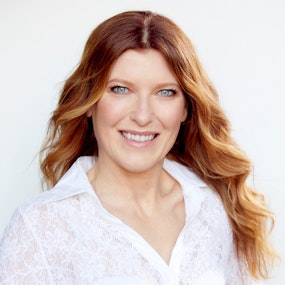
Luci Gabel
Nutritionist
Luci is an Adjunct Professor in Nutrition at San Jose State University. Luci has a M.B.A. from the Johns Hopkins Carey Business School, a Master's in Exercise Physiology, with an emphasis on Genetics, from the University of Maryland. She also completed a four-year degree program in Nutrition and Dietetics at the University of Maryland and has Bachelor's Degree in Physical and Psychological Health from Binghamton University (SUNY). She has a black belt in Tae Kwon Do, practices yoga and pilates, loves the gym, and travel. Currently living and working in Los Angeles, she's also lived and worked in Seoul, South Korea, Hawaii, New York City, Silicon Valley, and Washington, DC.
New to Futurized podcast?
Here are some great episodes to start with. Or, check out episodes by topic.



































